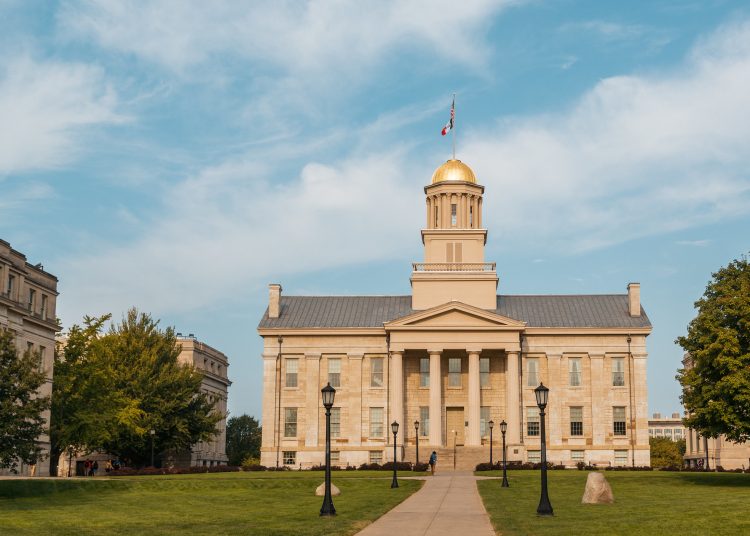DES MOINES, Iowa – The Iowa House Appropriations Committee on Monday voted 15 to 10 to advance LSB 1003YA, the education appropriation bill for Fiscal Year 2022.
The bill funds the College Student Aid Commission, the Iowa Department of the Blind, the Iowa Department of Education, and the Iowa Board of Regents.
According to the Legislative Services Agency (LSA), the bill provides $970.4 million for education from the state’s general fund and 11,766.4 full-time equivalent (FTE) positions in Fiscal Year 2022. Compared to FY 2021, the bill represents an increase of $24.4 million and a decrease of 56.8 FTE positions.
The appropriations bill increases appropriations for the Department of the Blind by $529,000, College Student Aid Commission by $11.5 million, and the Iowa Department of Education by $12 million compared to the estimated FY 2021 budget. It only increases the Iowa Board of Regents budget by $344,00, and that represents increases for the Iowa School of the Deaf and Iowa Braille and Sight Saving School.
Democrats on the Iowa House Appropriations Committee objected to the proposed funding level from the General Fund for Iowa’s regent universities remaining the same coinciding with a freeze of student tuition and mandatory fees.
State Rep. David Kerr, R-Morning Sun, the bill’s manager, said that during the subcommittee for the bill, he explained part of the rationale for not increasing the funding for Iowa’s three regent universities – Iowa State University, the University of Iowa, and the University of Northern Iowa – was due to the amount of COVID-19 aid the three schools received.
“And when you add up all the money that comes into the Regents, it’s about $240 million that they have had or will be getting here soon through the American rescue plan. And also, you can look at the declining enrollment. And we believe, too, that they’re increasing the administration, administrative positions, and not controlling the cost, and putting that off on fees and tuition,” he explained.
State Rep. Cindy Winckler, D-Davenport, said that COVID-19 relief funding is one-time funding and can’t go to operating expenses. She also noted that a large part of the FTE expansion over the last ten years at the University of Iowa is from expanding the University of Iowa Healthcare Centers and Clinics. Winckler also said that most Regents FTEs are not funded through the general fund.
“Who pays for that, potentially, are the students and the families and reduced access to coursework, and the inability to have the best professors, and scheduling that is impossible to meet because of what has to happen. So we have our state funding that is frozen. And in this bill, you also freeze tuition and fees. That is, we have frozen 100 percent of their budget, 100 percent of their budget, and their ability to fund the ongoing costs, inflation, as well as just the fixed costs that go up every year,” Winckler argued.
State Rep. Chris Hall, D-Sioux City, noted that the $8 million in cuts to the Iowa Board of Regents budget made last year was made permanent this year. He pointed out that the Governor wanted to increase the Regents’ budget and that the Iowa Senate appeared to be ready to replenish funding that was cut during the last session.
“The fact that your counterparts in the majority have signaled higher budget targets tells me that it’s possible that the dollars are there and that this chamber is choosing not to, and I think that’s unfortunate,” he said.
State Rep. Jennifer Konfrst, D-Windsor Heights, said that the budget hurts Iowa’s students.
“Even if there’s a tuition freeze put into place, programs will get cut, classes will get bigger, faculty won’t choose to come here, there’ll be fewer opportunities for students, and there will be fewer students,” she said.
State Rep. Sharon Steckman, D-Mason City, said she was “blown away” by the funding level for the Regents provided by the bill.
“Not giving a penny to the Regents, it makes no sense. We’re talking about bringing people into Iowa, being a welcoming state, but we’re not funding education,” she said.
State Rep. Kirsten Running-Marquardt, D-Cedar Rapids, said that the Regents’ funding levels would hurt the state economically.
“The problem we have is that the Regents are really an economic development driver in the state of Iowa. And when we cut them $8 million, and continue that cut over several years. It hurts us economically and also has a negative impact on our workforce. We desperately need to attract people to high-quality institutions like the Regents, and we need to keep them here in the state of Iowa for our state to prosper,” she said.
State Rep. John Forbes, D-Urbandale, said that the cuts would hurt attracting talent to the three state universities.
“I think we’re sending a terrible message to people that want to come to the state of Iowa to be professors at these three universities. The other concern is right now, the University of Iowa is in the process of hiring a new president, as we all know, and I only got four people coming in,” he said. “If I was going to look into becoming the President, I would want to see positive things happening in our universities, and not see our legislature cutting, or not really cutting, but not giving new funding to these universities.”
State Rep. Phyllis Thede, D-Davenport, said Iowa’s staples represent a three-legged stool – business, farming, and education.
“If that economy is short-sighted, you’ll begin to see how much we lose over the years. So I want to encourage you to think of this as a three-legged stool business, farming, and education. And one cannot do without the other,” she said.
State Rep. Steve Holt, R-Denison, countered that the COVID-19 funds could be used for technology investment and expenses related to COVID-19.
“So that means that Regents are not going to have to use that money, other money, for that because the federal government money is there. And when you put that with the fact that a lot of the Regents (universities) didn’t hold in-person classes, because I’ve certainly heard from some parents who thought that maybe they should get a refund compared to what they got versus what they thought they were paying for, it would seem to me that there could be some cost savings there,” he said.
“I’m not so sure they’re going to be in The Hurt Locker,” Holt added.
He also reminded the committee that the Regents are being funded and not having their funding decreased.
State Rep. Dave Williams, D-Cedar Falls, pointed out that even though Regent universities received $240 million in COVID-19 relief, the schools are around $100 million in the hole.
In his closing comments, Kerr said that the COVID-19 relief money, particularly the America Rescue Plan Act, schools could use the funding for any component of a student’s cost of attendance.
“The new program, the new American Rescue Plan money always can also can be used like colleges to invest in technology is a representative set. It can be used to defray other expenses associated with the pandemic, including new safety improvement facilities and staff training payroll, and here’s the important rd part that they all mentioned is to make up for lost revenue, so I think there are going to be plenty I don’t think they’ll have to cut people or programs,” he said.















